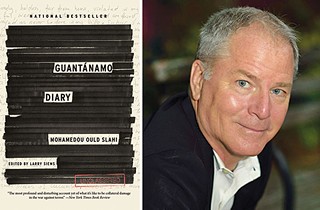In 2012, OR Books published Larry Siems’ The Torture Report: What the Documents Say About America’s Post 9/11 Torture Program. Among the many cases Siems covered, one that stood out was that of Mohamedou Ould Slahi, who had been detained in his native Mauritania in 2001. After renditions to Jordan and Bagram, in Afghanistan, Slahi was sent to the U.S. prison in Guantámano Bay, Cuba, where he suffered one of the cruelest interrogations on record there.
That interrogation — which included extended sleep deprivation, shackling for days in a freezing cell, beatings and more — lasted months. Like most Guantanamo prisoners, Slahi was never charged with a crime; he remains imprisoned there still. Yet, in 2005, Slahi managed to write a lengthy memoir about his experiences. In 2012, a heavily redacted version was finally declassified, and Slahi’s lawyers contacted Siems, a Brooklyn-based writer and activist, about preparing it for publication.
Guantánamo Diary, edited by Siems, was published this past January by Little, Brown and Company. It’s available in 18 countries (with more to come) and has been championed by the likes of John LeCarré and journalist Glenn Greenwald. On Nov. 11, Siems visits City of Asylum/Pittsburgh to discuss the book, and the secrecy reflected by its long incubation.
Slahi’s case appears to be one of wrong-place-wrong-time in the extreme. Though he joined Al Qaeda in 1990 to fight Afghanistan’s Communist government, he left the group in 1992, and most suspicion of him was by association: He was a distant cousin, for instance, of a top Osama bin Laden aide. And Siems notes in a phone interview that Slahi landed at Gitmo just as the military, under Secretary of Defense Donald Rumsfeld, was adopting CIA black-site torture techniques. Slahi’s treatment was a “special project” approved by Rumsfeld himself.
With essentially no evidence against him, why has Slahi been detained so long? Siems believes it’s largely been to avoid embarrassing the U.S. “It’s a very shameful story,” he says. Perhaps even more than Guantánamo’s other silenced captives, the personable, humane and highly sympathetic Slahi who comes across in Guantánamo Diaries casts the U.S. security apparatus in a terrible light. “There’s clearly been an effort to suppress or to conceal what’s a pretty embarrassing story,” says Siems.














